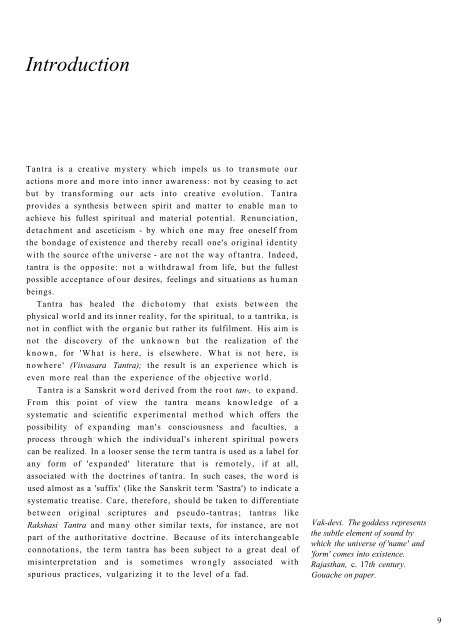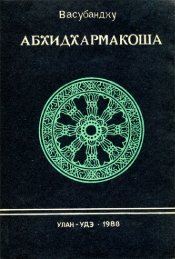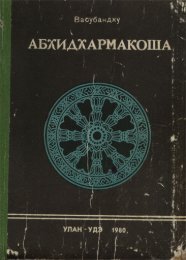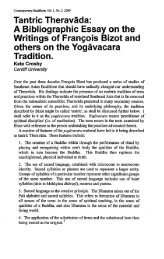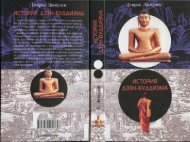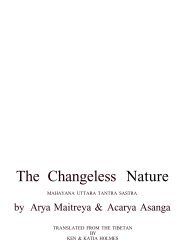You also want an ePaper? Increase the reach of your titles
YUMPU automatically turns print PDFs into web optimized ePapers that Google loves.
Introduction<br />
Tantra is a creative mystery which impels us to transmute our<br />
actions more and more into inner awareness: not by ceasing to act<br />
but by transforming our acts into creative evolution. Tantra<br />
provides a synthesis between spirit and matter to enable man to<br />
achieve his fullest spiritual and material potential. Renunciation,<br />
detachment and asceticism - by which one may free oneself from<br />
the bondage of existence and thereby recall one's original identity<br />
with the source of the universe - are not the way of tantra. Indeed,<br />
tantra is the opposite: not a withdrawal from life, but the fullest<br />
possible acceptance of our desires, feelings and situations as human<br />
beings.<br />
Tantra has healed the dichotomy that exists between the<br />
physical world and its inner reality, for the spiritual, to a tantrika, is<br />
not in conflict with the organic but rather its fulfilment. His aim is<br />
not the discovery of the unknown but the realization of the<br />
known, for 'What is here, is elsewhere. What is not here, is<br />
nowhere' (Visvasara Tantra); the result is an experience which is<br />
even more real than the experience of the objective world.<br />
Tantra is a Sanskrit word derived from the root tan-, to expand.<br />
From this point of view the tantra means knowledge of a<br />
systematic and scientific experimental method which offers the<br />
possibility of expanding man's consciousness and faculties, a<br />
process through which the individual's inherent spiritual powers<br />
can be realized. In a looser sense the term tantra is used as a label for<br />
any form of 'expanded' literature that is remotely, if at all,<br />
associated with the doctrines of tantra. In such cases, the word is<br />
used almost as a 'suffix' (like the Sanskrit term 'Sastra') to indicate a<br />
systematic treatise. Care, therefore, should be taken to differentiate<br />
between original scriptures and pseudo-tantras; tantras like<br />
Rakshasi Tantra and many other similar texts, for instance, are not<br />
part of the authoritative doctrine. Because of its interchangeable<br />
connotations, the term tantra has been subject to a great deal of<br />
misinterpretation and is sometimes wrongly associated with<br />
spurious practices, vulgarizing it to the level of a fad.<br />
Vak-devi. The goddess represents<br />
the subtle element of sound by<br />
which the universe of 'name' and<br />
'form' comes into existence.<br />
Rajasthan, c. 17th century.<br />
Gouache on paper.<br />
9


